Diversity in Biology Speaker Series
The 2022 Diversity in Biology Speaker Series highlighted the work of academics that are early in their careers, and who identify with groups that are traditionally under-represented in the Biological Sciences. These talks highlighted excellent science across the spectrum of the sub-disciplines in Biology.
These talks included a 50-min seminar by the invited speaker and an extended Q&A session, where both the speaker and audience were encouraged to reflect on the current challenges in their field, especially with respect to diversity, equity and inclusion.
PAST SEMINARS
Watch webinars from the Diversity in Biology Speaker Series.
Dr. Janice Leung | April 28, 2022
Insights into Chronic Lung Disease in People Living with HIV
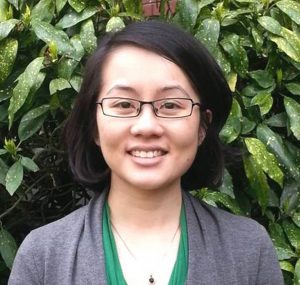
Although people living with HIV (PLWH) have had remarkable improvements in mortality and morbidity since the discovery of antiretroviral therapy, they now face a greater burden of chronic diseases often associated with aging. PLWH appear to have a higher risk of developing chronic obstructive pulmonary disease (COPD), which results in symptoms such as shortness of breath, cough, and sputum production. This risk is not completely explained by cigarette smoke exposure alone and the underlying mechanisms explaining why they appear susceptible to this lung disease are unclear. Microbial dysbiosis and accelerated aging will be discussed as possible mechanisms of lung disease in HIV.
About the Speaker
Dr. Leung is a clinician-scientist at the University of British Columbia (Assistant Prof), where she both has a clinical practice devoted to the respiratory care of patients living with HIV at St. Paul’s Hospital and also a translational laboratory at the Centre for Heart Lung Innovation. She is a Tier 2 Canada Research Chair in Translational Airway Biology and her work is supported by the Canadian Institutes of Health Research, the Michael Smith Foundation for Health Research, Genome BC, and the BC Lung Association.
Dr. Leo Ng | March 24, 2022
A tamoxifen receptor site in voltage-gated sodium channel
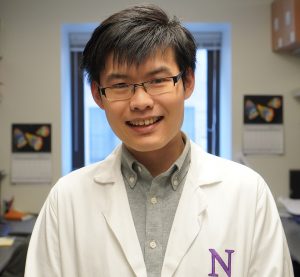
Voltage-gated sodium channels are targets for many analgesic and antiepileptic drugs whose therapeutic mechanisms and binding sites have been well characterized. Tamoxifen, an estrogen receptor modulator, and its metabolites bind at the intracellular exit of the channel, which is different from other previously characterized drug sites. These compounds inhibit sodium channels and prevent sodium conductance by delaying channel recovery from the inactivated state. This study describes the structure and pharmacology of a site that could be aid in drug discovery for treating sodium channelopathies, and may imply off-target health effects of this widely used therapeutic drug.
About the Speaker
Leo was raised in Richmond, BC and did both his bachelor’s and Ph.D. at UBC. He was trained under Dr. Eric Accili, and having Biochemistry background, he took on the project that involves the cyclic nucleotide binding site of the pacemaker channel. He then did a post-doc at Northwestern University under the mentorship of Dr. Paul DeCaen, where he learned to do patch clamping. Today he will share one of those projects which showed the structure and blocking mechanism of tamoxifen on voltage gated sodium channels.
Dr. Mehran Dastamachi | March 17, 2022
Looking for unknown unknowns in specialized metabolism
 Plants produce a diverse array of specialized metabolites, contributing to or inspiring many medicines in use today. The study of plant metabolism has revealed the secrets of plants such as opium poppy and Madagascar periwinkle, responsible for a host of analgesic and anticancer drugs. The first step in leveraging plant biochemistry is knowledge of the genes, enzymes, and auxiliary components required to convert simple compounds to complex drugs. Attempts to reconstitute such pathways in heterologous systems (e.g., yeast) have encountered “carbon loss” in the form of unexpected by-products. What auxiliary features in plants circumvent, or even preclude, such branching pathways?
Plants produce a diverse array of specialized metabolites, contributing to or inspiring many medicines in use today. The study of plant metabolism has revealed the secrets of plants such as opium poppy and Madagascar periwinkle, responsible for a host of analgesic and anticancer drugs. The first step in leveraging plant biochemistry is knowledge of the genes, enzymes, and auxiliary components required to convert simple compounds to complex drugs. Attempts to reconstitute such pathways in heterologous systems (e.g., yeast) have encountered “carbon loss” in the form of unexpected by-products. What auxiliary features in plants circumvent, or even preclude, such branching pathways?
Mehran Dastmalchi joined McGill University as an Assistant Professor in the Department of Plant Science in the Fall of 2020. He is setting up a research program to study metabolism in legume species (Fabaceae), with interest in pathways producing defence and health compounds. He received his Ph.D. from Western University (2015) and completed postdoctoral fellowships with Dr. Facchini (2015-2018) and Dr. De Luca (2018-2019).
Dr. Erika Villanueva | March 10, 2022
Neuroinflammation in Neurodegeneration and Parkinson’s Disease
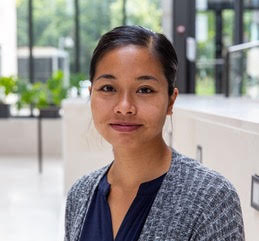
Erika Villanueva
Aging-related neurodegenerative disorders such as Parkinson’s disease (PD) are devastating to affected individuals, their families, and society as a whole. Unfortunately, there is no known cure. Identifying underlying disease mechanisms are therefore imperative for identifying novel drug targets and ultimately to provide more meaningful outcomes for patients diagnosed with PD. This talk focuses on how neuronal and glial immune signaling in the central nervous system (CNS) contributes to brain homeostasis and health, with specific focus on how disrupted signaling between the immune cytokine interferon beta (IFN-β) and its receptor, interferon alpha-beta receptor 1 (IFNAR1), leads to development of disease resembling PD with dementia in vivo. Research outcomes suggest that neuronal IFN-β-IFNAR1 signaling is required for brain homeostasis and highlights the need for cell-specific immunomodulatory approaches in developing therapeutics for chronic neurodegenerative disorders like PD.
About the Speaker
Dr. Erika B. Villanueva is a Filipino-Canadian currently living in Denmark. She grew up in Coquitlam, BC, and earned her BSc at the University of Waterloo in 2008. From 2009 to 2011 she earned her MSc in Dr. Andis Klegeris’ Molecular and Cellular Pharmacology group here at UBCO, after which she moved back to Vancouver to spend the next four years in Dr. Michael R. Hayden’s Huntington’s Disease Research Group at the Centre for Medical Medicine and Therapeutics as a research technician. In 2016, Erika moved to Copenhagen, Denmark, to study neuroinflammation at the Biotech Research and Innovation Centre, University of Copenhagen, under the guidance of Dr. Shohreh Issazadeh-Navikas. She earned her doctorate last fall, and is now a postdoctoral researcher in the Molecular Pharmacology group at the Department of Drug Design and Pharmacology, University of Copenhagen. She is excited to give a talk on her doctoral research today, and to offer perspectives on diversity and challenges facing women and POC in academic research.
Dr. Yaxi Hu | March 3, 2022
Application of ‘omics tools for the analysis of food integrity

Dr. Yaxi Hu
To safeguard consumers’ health and rights, food professionals have committed to ensuring the integrity (i.e., safe, high quality and authentic) of food products along the supply chain from the farm to the fork. Among the different approaches, analytical tools that can identify defective food products serve as the last barrier to prevent those products from contaminating the supply chain. Involving complex sample matrices, analytical tools for food integrity analysis need to be sensitive and have high resolution. Omics tools, originally developed to analyze collection(s) of chemicals in biological samples, have attracted attention of food researchers due to their excellent performance in analyzing complex sample matrices. My presentation will focus on how we applied omics tools to solve a variety of food integrity related challenges.
About the Speaker
Dr. Yaxi Hu is currently working as a postdoctoral fellow at Health Canada and will join the Department of Chemistry, Carleton University as an Assistant Professor in the coming July. Dr. Hu received her PhD degree from the University of British Columbia, Vancouver in 2018, majoring in Food Science. Her research has focused on the development of innovative analytical methods using spectroscopic, metabolomic and genomic tools, as well as microfluidic “lab-on-a-chip” platform for the detection of food safety, quality and authenticity issues. She has published 26 peer-reviewed articles in top journals and won several prestigious awards including the Mitacs Outstanding Innovation-PhD in 2016 and the First place of ACS Withycombe-Charalambous Graduate Student Symposium in 2018.
Dr. Jared Ali | February 10, 2022
Chemical Ecology of Plant Defense and Multi-trophic Interactions: Bad Bugs, Pungent Parasites and Toxic Travelers.
This talk discussed the behaviour and chemical ecology of multi-trophic interactions, including plant responses to herbivory, nematode and insect chemical ecology, in agricultural and conservation contexts. Examples of research projects include trophic cascades associated with cover crops, above-belowground interactions, and the consequences of diet on insect dispersal.
About the Speaker

Dr. Jared Ali
Dr. Jared Ali is currently an Assistant Professor in the Department of Entomology at Pennsylvania State University. He received both his Bachelor’s and Master’s Degrees from The University of Delaware, before moving on to the University of Florida for his PhD. He did post-doctoral work at Cornell, and also spent some time at Michigan State as an Assistant Professor, prior to moving to his current position in 2016. Dr. Ali’s research focus is on the behaviour and chemical ecology of multi-trophic interactions.
Dr. Nokwanda (Nox) P. Makunga | February 17, 2022
Through the Looking Glass: Exploring the Medicinal Botanical Treasures of South Africa
Dr. Makunga discussed how South Africa has an incredible floral heritage that has medical and psycho-cultural significance to local people. Diverse ethno-cultural utilization is thus encouraging entry of new products into global markets based on South African plant endemics.
This talk showcased the diverse floral riches of South Africa that are of medicinal importance and their historical context. It provided the unique opportunities that are presented by interfacing various biotechnologies to Cape plants, to bolster scientific information. Finally, it illustrated the exciting potential of exploring the medicinal biodiversity of South Africa and how this is important for both its commercialization and conservation.
About the Speaker
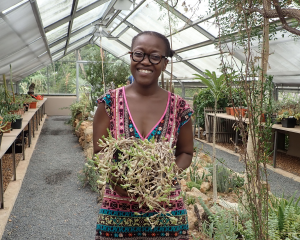
Dr. Nokwanda Makunga
Dr. Nokwanda Makunga is an Associate Professor at Stellenbosch University in South Africa. In 2004, she received her BSc and PhD from the University of KwaZulu-Nata. She has won several awards, including the National Science and Technology Award for Distinguished Young Black Researcher, the TW Kambule Award and a Fullbright Scholar acknowledgement. Dr. Makunga is also one of the leaders of Black Botanists Week, which is a social media event that runs annually.
Dr. Laura Melissa Guzman | March 31, 2022
Trophic Metacommunities: Lessons from the bromeliad system
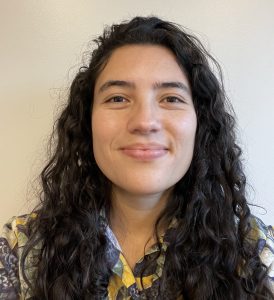
Metacommunity theory provides an understanding of how spatial processes determine the structure and function of communities at local and regional scales. Although metacommunity theory has considered trophic dynamics in the past, it has been performed idiosyncratically with a wide selection of possible dynamics. I present a recent synthesis of trophic metacommunity ecology that incorporates variability among trophic levels in ‘spatial use properties’. I also bring together two different empirical approaches to understand trophic metacommunities as exemplified by bromeliads macro-invertebrates.
About the Speaker
Dr. Guzman is a computational ecologist originally from Bogotá, Colombia. She completed her PhD at UBC and did her postdoctoral work at Simon Frasier University, also in BC. She is currently an Assistant Professor in the Ecological Data Sciences Lab at the University of Southern California, where her main motivation is to use quantitative and computational tools to learn about patterns and processes in biodiversity to inform conservation actions.
Dr. Ally Menzies | April 7, 2022
Weaving Knowledge Systems in Environmental Monitoring and Research
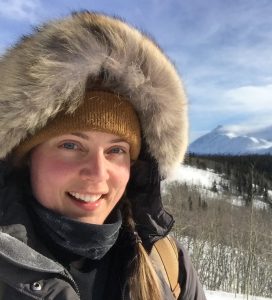
A major barrier to weaving knowledge systems in environmental monitoring and research is a general uncertainty of how to do so in practice. Developing approaches to environmental stewardship that truly respect multiple knowledge systems requires a deeper understanding of what it means to work together in a good way.
Dr. Menzies will discuss her work that provides guidance, case-studies and inspiration for other researchers and environmental professionals to weave Indigenous Knowledge and western science into their research, monitoring and management.
About the Speaker
Dr. Ally Menzies is a Métis scholar originally from Manitoba (Treaty 1 and Treaty 2 territory). She recently completed her PhD at McGill University, where she used animal-borne dataloggers to characterize physiological and behavioural responses of boreal mammals to fine-scale environmental variation. She is currently a postdoctoral fellow with the Wildlife, Indigenous Science, Ecology lab at the University of Guelph and works in partnership with Nature United and Indigenous groups across Canada to identify important Indigenous values to consider in environmental monitoring.
Dr. Yasmin Nasser | April 14, 2022
The Microbiome, Chronic Abdominal Pain and IBD

Dr. Yasmin Nasser’s talk will touch on recognizing the burden of chronic pain in the absence of inflammation in IBD. Dr. Nasser will explore how microbial manipulation modules the development of visceral pain in a mouse model of IBD. She will demonstrate that microbial derived soluble products are able to sensitize pain-sensing neurons.
About the Speaker
Dr. Yasmin Nasser is an Assistant Professor in the Department of Medicine and a clinician-scientist in the Division of Gastroenterology and Hepatology.
She is a member of the Gastrointestinal Research Group and of the Snyder Institute for Chronic Disease.
She completed her MD/PhD (Enteric Neurobiology) in 2008, medical residency at the University of British Columbia and gastroenterology fellowship training at the University of Calgary. Thereafter, she went on to complete both an advanced fellowship in Clinical GI Motility, as well as a postdoctoral fellowship under the supervision of Dr. Stephen Vanner at Queen’s University where she studied basic mechanisms of visceral pain and hypersensitivity.
She has been the recipient of several prestigious awards, including a Crohn’s Colitis Canada Rising Star Award, a CAG/CIHR/CCC Fellowship, the John Alexander Stewart Fellowship, and a Young Investigator Award from the American Neurogastroenterology & Motility Society.
Dr. Nasser has recognized expertise in visceral pain, functional GI disorders and GI motility. She runs an IBD Chronic Pain Clinic at the University of Calgary, which is unique in Canada, where she treats IBD patients in endoscopic remission who continue to suffer from chronic pain. She is also co-lead for the University of Calgary High-Risk IBD clinic, which sees undifferentiated patients with diarrhea and abdominal pain, with the aim to provide a rapid diagnosis and initiate early treatment for IBD.
Dr. Nasser’s CIHR and Weston funded translational research program is focused on the role of the microbiome in the development of chronic pain in IBD. The overall goal is to develop innovative approaches to the treatment of chronic pain, thus improving quality of life and preventing the use of chronic narcotics.
Dr. Margarita Lopez-Uribe | April 21, 2022
Squash Bees, Crop Cultivation and Climate Adaptation
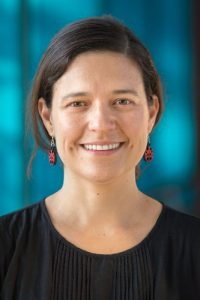
The expansion of agriculture has shaped biodiversity across the planet in profound ways. In this talk, I will present data combining information from genetic markers, species distributions, and thermal tolerance demonstrating the demographic history and ecology of a specialist squash pollinator have been shaped by the expansion of agriculture. This system presents a case study of pollinator adaptation and resilience to anthropogenic changes.
If you would like access to the recording, please email Dr. Robin Young or connect with the speaker via their web page.
robin.young@ubc.ca
About the Speaker
Dr. Margarita Lopez-Uribe is the Lorenzo L. Langstroth Early Career Professor and Assistant Professor of Entomology at Penn State University. She is also an extension specialist in pollinator health for Penn State Extension. Dr. Lopez-Uribe received her BS in Biology from Universidad de los Andes (Colombia), her MS in Genetics and Evolution from Universidade Federal de São Carlos (Brazil) and her Ph.D. in Entomology from Cornell University (USA). She was an NSF postdoctoral research fellow at North Carolina State University before joining Penn State. Margarita was awarded the ESA Early Career Research Award in 2018 and most recently received an NSF CAREER award. As an evolutionary ecologist, she is broadly interested in understanding how artificial selection and management shape bee health and the long-term persistence of their populations in agricultural areas.
Organizing Committee
Graduate Student Organizers
Cat Fauvelle
Graduate Student, Biology
Irving K. Barber Faculty of Science
Shirley Sijie Yang
Graduate Student, Biology
Irving K. Barber Faculty of Science
Faculty Organizers
Karen Hodges
Professor, Biology
Irving K. Barber Faculty of Science
Robin Young
Assistant Professor of Teaching, Biology
Irving K. Barber Faculty of Science
SUPPORT
This speaker series is funded by the UBC Anti-Racism Initiatives Fund, The Irving K. Barber Faculty of Science at UBC Okanagan, and the UBC Okanagan Department of Biology.
